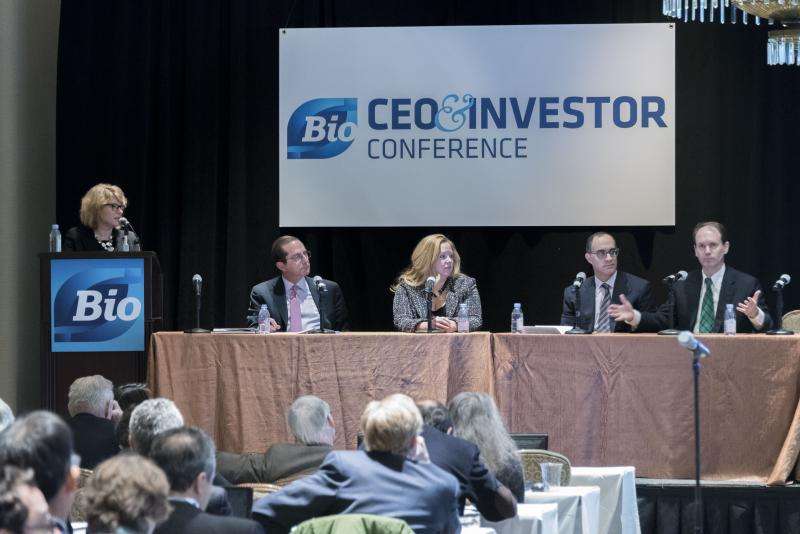An expert panel convened in New York City on Tuesday at the BIO CEO and Investor Conference to discuss public health policy under the new Administration and what it might mean for the biotech industry.
To start things off, moderator Susan Peschin, president and CEO of the Alliance for Aging Research, said that the discussion would take a look at what is likely to happen, and separate it from the hype that has grabbed news headlines.
Two topics that panelists dove into were the Affordable Care Act, and thoughts on a new Food and Drug Administration (FDA) Commissioner.
Overall the industry experts seemed to agree that a piece of legislation repealing the ACA will pass in 2017, but all were cautious with predictions as to what form it would take.
Alex Azar II, Chairman of Seraphim Strategies LLC, former president of Lilly USA, and former Deputy Secretary of the U.S. Department of Health and Human Services from 2005 to 2007, said that he believes there’s been a broad mischaracterization as to what the debate is over healthcare.
There is a responsibility to get healthcare to those who can’t afford it, he said, but the question is over how to go about that.
“Some people in my industry disagree with the path Obama took, but it doesn’t mean we don’t believe people should have insurance,” Azar said.
Straight repeal of the ACA won’t be acceptable without a replacement, in Azar’s eyes, a sentiment many of the panelists echoed.
Panelist Jeanne Haggerty, senior vice president of Federal Government Relations for Biotechnology Innovation Organization (BIO) said that there’s currently a lot of disagreement about the path forward for ACA repeal and replace, and she thinks it’s likely we’ll see a number of hearings and potential mark ups on smaller bills. Congress could potentially keep moving smaller pieces of legislation through one at a time, and then eventually package together.
“Most republican leadership are feeling the heat of constituencies that don’t fully understand repealing and replacing won’t leave people without health insurance,” Haggerty said.
Azar noted that it’s important to remember when thinking about repeal and replace that there is a “prime directive for politicians – to get re-elected.”
On Thursday senior House Republicans revealed a preliminary outline of healthcare overhaul. It involves a revamped Medicaid program for the poor, tax breaks to help people pay doctors’ bills and federally subsidized state pools to support those with costly medical conditions in buying insurance, the Associated Press reported.
Panelist Johnathan Leff, partner at Deerfield Management and Chairman of the Deerfield Institute, gave some insight into what kind of implications repeal without a clear replacement would have on investments in the biotech industry. While it’s fairly evident that there will be some kind of bill repealing ACA, Leff said, there is a right way and a wrong way to do it.
Investors, especially in the biotech world where investments are made over a long period of time, don’t like uncertainty, according to Leff. Uncertainty can have a very negative impact on investments, Leff said and in his eyes “the right way to do it is replace when you repeal.”
As long as legislation is rolled out in a way that people can see changes coming, it will be better from an investor point of view, he said.
Leff is optimistic that “reason will prevail” and that people won’t dismantle what is in place without knowing what to replace it with. However, he noted that in this environment with the current Administration there’s always a chance that won’t happen. He said he replace and repeal will hopefully be less disruptive than some other recent changes, such as Trump’s temporary immigration ban.
Bryan Rye, a Senior Health Policy Analyst at Bloomberg Intelligence used an analogy about replacing a bridge.
“You don’t just blow up the bridge, you provide temporary support,” he said.
If the ACA was working as well as promised, Hilary Clinton might be president, Rye said, noting that there were not enough young healthy people in exchanges and insurers were pulling out. He expects that in new legislation there will be more emphasis on HSA’s, and no mandates, or at least penalties associated with them will go away.
He does not think the process will be an easy one. “Don’t expect for it to be a kumbaya between republicans and democrats,” Rye said.
FDA implications and thoughts on safety and efficacy policy issues
The general consensus with the panel was that potential changes at the FDA could have a big impact on biotech, both in medical advances and investment climate.
“In some ways it feels like an existential moment for the FDA,” Leff said. He noted that some of the people who have been rumored candidates for FDA commissioner have made statements that drugs should not be regulated for efficacy.
“The FDA for the last 40 years has been about regulating efficacy and safety, if that were to change it would make it fundamentally different to how we think about developing and making drugs,” Leff said.
A major change like that would have a “very very negative impact” on biotech investment, Leff explained.
He said that in his own informal poll of talking to people in the industry gave him the sense that the current FDA environment works quite well, and that everyone has designed activity in line with the framework that’s been in place.
Some people are unhappy with certain aspects of the FDA, Leff admitted, but said those were micro areas of concern. It would become exceedingly difficult to invest in science-driven biotechnology if the need to test efficacy was eliminated, Leff said and would make most biotech executives nervous.
“Throwing out the idea of drug regulation is a very dangerous idea,” Leff said, and emphasized that making policy makers understand that is very important.
Good policy would work to continue to improve the process, such as improvement in clinical trial design.
Leff pointed out that President Trump’s pick to lead the Environmental Protection Agency (EPA), Scott Pruitt, is someone who doesn’t fundamentally believe in the need for the agency. Some people think that by appointing a person who questions the underlying mission of that agency that they are pursuing a pro-growth agenda, because there are unnecessary regulations that prohibit development – however the opposite is true in biotech, Leff said. He wants to see an FDA commissioner appointed that believes in the basic mission of the agency.
Haggerty was also concerned over stopping the regulation of efficacy by the FDA, noting it is an important part of the drug approval process.
She said it’s BIO’s job to educate people going into the FDA about changes that have happened in 21st century cures, such as increased biomarkers.
Another goal of the organization is to make sure the Prescription Drug User Fee Act (PDUFA) is reauthorized when it is set to expire this September. PDUFA was a law passed by Congress in 1992 which allows the FDA to collect fees from drug manufactures to fund the new drug approval process, and must be reauthorized every five years.
Keeping the agreement intact is a primary objective for the organization, Haggerty said.
Ultimately, it’s about making sure patients get access to therapies they need without disrupting the market, Haggerty said.
In a time of uncertainty, the biotech industry will continue to watch any new developments closely.





